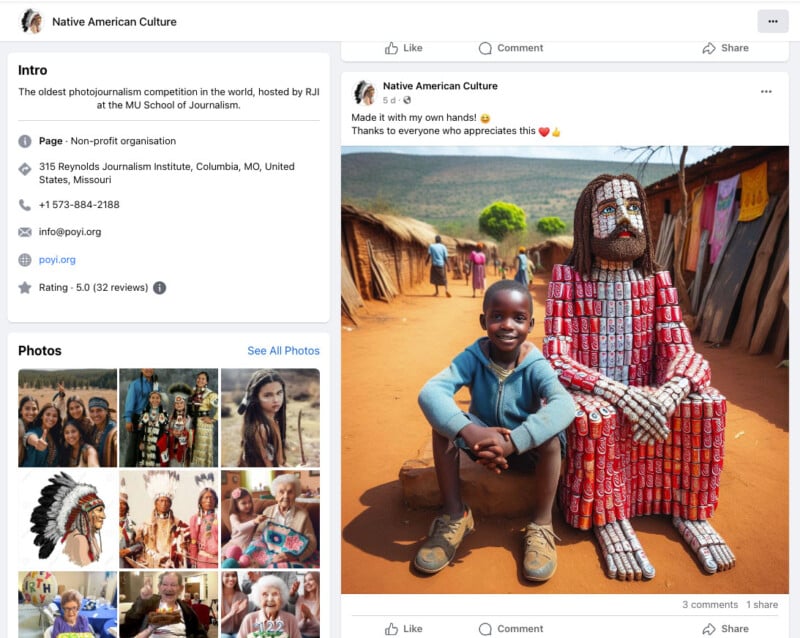The Facebook page for Pictures of the Year International has been hacked with bizarre AI images being posted instead of photography — as AI-generated content sweeps across Facebook.
Since March 13, strange AI images have been shared from the Pictures of the Year Facebook page which has now been renamed “Native American Culture.”

Co-director of the Asia arm, Kay-Chin Tay, confirmed to PetaPixel that the page has been hacked with the admin team at a loss at what to do. “[We] still can’t do anything other than tell Facebook. They got us good…kicked off all our admins,” reads a note shared on one of the posts.
Pictures of the Year International (POYI) is operated by the University of Missouri and runs an annual competition. Before March 13, the Facebook page was sharing information on its latest photo contest but since then it’s been nothing but peculiar AI-generated images.
Why is There So Much AI Content on Facebook?
The hack of POYI coincides with a report from Stanford University that scammers are leveraging AI-generated images on Facebook for audience growth.
A viral tweet last week shared a picture of “Shrimp Jesus”, an AI image that has repeatedly gone viral on Facebook.
WHAT IS HAPPENING ON FACEBOOK pic.twitter.com/6XzTV5eBd3
— Jorge Murillo 💙 (@TheHornetsFury) March 13, 2024
“These images in total account for hundreds of millions of interactions and are shown through Facebook’s Feed to some Facebook users who do not follow the Pages,” says Renee DiRestra of Stanford’s Internet Observatory and Josh A. Goldstein of Georgetown’s Center for Security and Emerging Technology in their research.
“While Shrimp Jesus is (perhaps) an artistic fantasy—created by a page that previously shared clickbait links to a content farm—comments on many of the AI-generated images of more mundane things, like housewares, homes, or artwork purportedly created by children, suggest many users are unaware of the synthetic origin.”
The reason for hacking POYI’s Facebook page is so far unclear but the Stanford researchers say they have witnessed spammers trying to drive people to off-platform websites, sell products, and build bigger audiences.
What Are Facebook About Doing This?
In short, nothing. A 404 Media investigation said that it has viewed thousands and thousands of AI images on Facebook and only one had an “altered photo” tag. The platform has so far failed to take action on pages posting large volumes of AI material.
This despite Meta announcing last month that it will begin labeling images detected to be AI-generated across Facebook, Instagram, and Threads.
The pages sharing AI content appear to be doing well from it because interactions with AI content are rapidly increasing and once a user interacts with an AI image they find themselves being “recommended” more AI content, according to the Stanford researchers.
